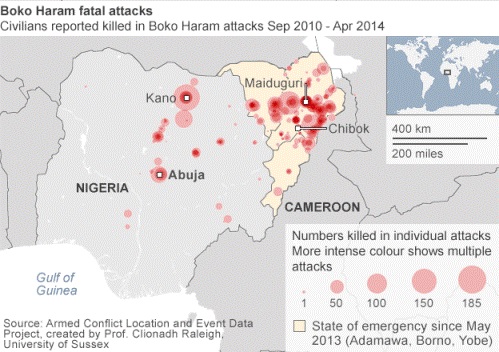On May 5, Abubakar Shekau, the leader of Boko Haram, said in a video statement that his group was behind the abduction of the girls. Shekau further claimed that “slavery is allowed in my religion, and I shall capture people and make them slaves.” Boko Haram, the insurgent group opposed to the Westernization of Nigeria, is currently considered as the root cause of criminal behavior in the nation. Responding to the Boko Haram insurgency after thousands had been killed in the attacks, Nigerian government set up a Special Military Task Force to counter the group in some states, including Borno where the abduction took place.

Opposing any secular Western education, the group has announced that attacks would continue as long as the Nigerian government continued to interfere with traditional Islamic education. Since 2010, the group has targeted schools and as a result, made about 10,000 children unable to continue their education. Boko Haram has been kidnapping girls in particular, as they strongly believe that women should not be educated. After the abductions, the group has used them as cooks or sex slaves. In May 2013, Boko Haram made a similar threat to that of the recent abduction, claiming the group had taken women and teenage girls hostage in response to the arrest of its members’ wives and children. Later, both sides released the captured women and children in a prison swap. In 2014, Boko Haram’s attacks have intensified further, resulting in nearly 4,000 deaths just this year. Experts said that training received from al-Qaeda had helped the intensification of its attacks. In February, the group killed more than 100 Christian men in Doron Baga and Izghe. Moreover, boys in northeastern Nigeria were killed in the Federal Government College attack. In March, Boko Haram attacked the Giwa military barracks and released captured militants. The Chibok abduction happened on the same day as a bombing attack in Abuja, which led to at least 88 deaths.
The religious conflicts between Muslim and Christianity as shown from the current tragedy go back much further than the recent abduction. Though the Boko Haram attacks have started in 2002, the Islamist insurgency in Nigeria began as early as 1999. According to a study on Nigerian demographics and religion, about 50.5% of the entire population are Muslims and mainly live in the northern part of the country. Christians are the second-largest religious group, making up 48.2% of the total population. They usually live in the central and southern regions. As Muslims are the majority of the population, twelve Northern states have introduced the Sharia, the Islamic law, as the basis of the executive and judicial branches of their government in 1999 and 2000. From 2000, riots between the two religious groups have resulted in thousands of fatalities.
Islamist insurgency in Nigeria is not the only conflict in Africa that causes more than thousands of violent deaths per year. Other than the insurgency in Nigeria, the United Nations and Uppsala Conflict Data Program have identified that four among the total eleven ongoing armed conflicts resulting in more than 1,000 fatalities per year take place in Africa: Somali Civil War, Egyptian Crisis, Central African Republic conflict, and South Sudanese Civil War. Africa has become increasingly vulnerable to acts of terrorism from various armed groups around the continent. Amnesty International blamed these armed groups for various human rights abuses: indiscriminate attacks, unlawful killings, abductions, and torture. Opposing such abuses, some governments in Africa have increased their military co-operation, while some neighboring countries have even decided on the military intervention. Ironically, Amnesty International pointed out that government security forces were often responsible for human rights violations during their retaliation against the armed groups. Regarding such abuses of human rights, Amnesty International said, “Improved respect for and protection of human rights will probably not develop as quickly and dramatically in sub-Saharan Africa as in North Africa. In some places, the situation might even get worse.” However, it also expects that factors including sustained economic growth, demands for better governance, an emerging middle class, stronger civil society, and improved access to information and communication technology will help promote human rights in African nations.

